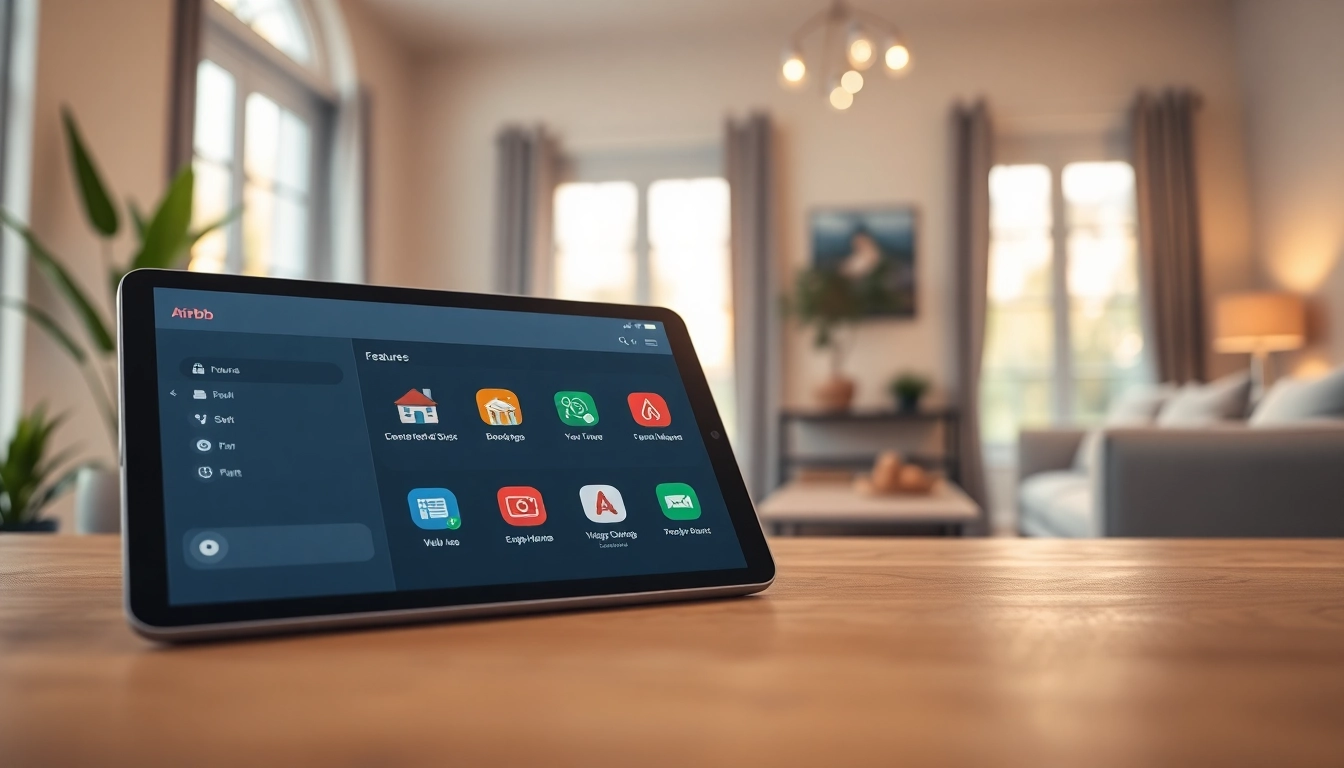Understanding the Airbnb Smart Assistant
What is an Airbnb Smart Assistant?
The Airbnb smart assistant is a cutting-edge tool designed to enhance the hosting experience for property owners while providing seamless communication and high-quality service for guests. This innovative integration of artificial intelligence technologies into the hospitality sector serves as a virtual concierge, managing various tasks ranging from guest inquiries and bookings to follow-up communication and feedback collection. By utilizing this assistant, hosts can significantly streamline operations, reduce response times, and ultimately deliver a more satisfying experience for their guests. In the current digital age, implementing an Airbnb smart assistant has become an essential strategy for property owners who aim to stay competitive in the fast-evolving market of short-term rentals.
Key Features and Benefits
The Airbnb smart assistant comes equipped with a variety of features designed to simplify the management of rental properties. Key functionalities include:
- Automated Communication: The assistant can handle guest inquiries round-the-clock, responding to questions about the property, booking conditions, and local attractions. This ensures that no guest is left waiting for a response—a critical aspect of maintaining good reviews.
- Booking Management: It can manage reservations and cancellations seamlessly, adjusting availability in real-time across various platforms.
- Personalized Recommendations: The smart assistant analyzes guest preferences and past interactions to provide tailored suggestions for local restaurants, activities, and experiences—fostering a more personalized stay.
- Feedback Collection: By reaching out to guests post-stay for feedback, the assistant helps identify areas for improvement, ensuring an incremental enhancement in service quality over time.
- Integration with Property Management Systems: The assistant provides added functionality by integrating with existing property management solutions, allowing for centralized control over operations and improved data analytics.
How It Enhances User Experience
The user experience for both hosts and guests is greatly improved through the implementation of an Airbnb smart assistant. For hosts, the assistant automates repetitive tasks allowing them to focus on more strategic areas of their property management. It also enhances operational efficiency, meaning less time is wasted on back-and-forth communications. For guests, the benefit lies in the immediacy and personalization of responses. Guests feel valued when they receive timely replies and tailored recommendations that cater to their specific needs. As a result, the overall guest satisfaction increases, leading to more positive reviews and repeat bookings—a vital component of success in the short-term rental market.
Setting Up Your Airbnb Smart Assistant
Initial Configuration Steps
Setting up your Airbnb smart assistant involves several key initial configuration steps. Here’s a breakdown:
- Account Creation: Begin by creating an account on the platform providing the Airbnb smart assistant. This could involve setting up user details and linking your Airbnb listing.
- Property Information Input: Enter relevant information about your property, including descriptions, amenities, and key policies that the assistant will reference during guest interactions.
- Customization of Communication Preferences: Tailor the interaction style and tone of the assistant. Establish guidelines for how the assistant should respond to various inquiries, ensuring alignment with your brand voice.
- Testing and Adjusting: Before going live, test the assistant’s functionality by simulating guest interactions. Make necessary adjustments to ensure a smooth operational experience.
Integrating with Your Property Management System
Integrating the Airbnb smart assistant with your existing property management system is essential for maximizing its potential. Here’s how you can facilitate this integration:
- API Compatibility: Ensure your property management system supports API integration, enabling the smart assistant to communicate freely with existing software.
- Data Synchronization: Set up data synchronization protocols to ensure that both systems update in real-time. This means any changes to bookings or properties reflect accurately across both platforms.
- Testing the Integration: Conduct thorough testing to verify that the assistant accurately pulls data and interacts with the management system as intended. Be attentive to potential discrepancies and address them promptly.
Common Setup Challenges and Solutions
While setting up the Airbnb smart assistant can vastly improve your property management, challenges may arise. The following are common issues along with their solutions:
- Technical Difficulties: If you face technical issues during integration, consult the user manual or support resources provided by your Airbnb smart assistant’s platform. You may also want to check online forums for user-shared solutions.
- Customization Challenges: It may take time to refine the communication templates to suit your brand’s voice. Consider reviewing interactions post-setup and adjusting based on guest feedback.
- Data Miscommunication: In cases of mismatched information between systems, ensure that you routinely audit data consistency and troubleshoot any discrepancies immediately to maintain guest trust.
Optimizing Performance for Guest Interactions
Improving Communication with Guests
Effective communication is pivotal in the hospitality sector, and the Airbnb smart assistant can significantly enhance this. Here are important tips:
- Utilizing Chatbots: Incorporate advanced chatbot functionalities that allow for immediate responses to common inquiries, making guests feel valued and attended to.
- Setting Clear Parameters: Define clear boundaries for the assistant’s responses. For instance, if the system cannot help with complex inquiries, create protocols for escalating to human staff.
- Multilingual Capabilities: If relevant, enable multilingual features to accommodate a diverse range of guests, enhancing their comfort and engagement.
Utilizing Data Analytics for Better Service
Employing data analytics can lead to significant improvements in service delivery. Here’s how to leverage analytics effectively:
- Monitoring Guest Interactions: Collect data on guest interactions to identify frequently asked questions and common concerns. This knowledge can inform adjustments in your offerings and communication style.
- Performance Metrics Tracking: Set performance metrics for the assistant to measure its efficacy. Analyze guest satisfaction ratings and response times to refine service delivery continually.
- Market Trends Analysis: Leverage analytics to stay informed on market trends, such as preferred travel dates or amenities. This information can help tailor offers and services to meet evolving guest expectations.
Feedback Mechanisms to Enhance Performance
Establishing robust feedback mechanisms is essential for continuous improvement. Consider the following strategies:
- Post-Stay Surveys: Implement automated follow-up surveys soliciting guest feedback on their experience interacting with the assistant. Analyzing this feedback can direct future adjustments.
- Engagement Analytics: Monitor engagement levels with the assistant. Understanding which features are most utilized can inform feature enhancements and marketing strategies.
- Response Adjustment: Regularly revisit and refine the automated responses based on feedback patterns to better align with guest expectations.
Marketing Your Airbnb Smart Assistant
Strategies to Highlight Your Offering
Effectively marketing your Airbnb smart assistant can set your property apart. Here are strategic approaches:
- Highlighting Unique Features: Use your property listing to emphasize unique capabilities of the smart assistant, such as 24/7 availability and personalized recommendations.
- Encouraging Reviews: Prompt guests to mention their interactions with the smart assistant in reviews, promoting its effectiveness and enhancing credibility.
- Social Media Campaigns: Create social media content showcasing how the smart assistant improves guest experiences, using visual content like videos or testimonials.
Engagement Techniques for New Guests
Engagement techniques tailored to new guests can create a welcoming atmosphere from the moment they book. Here are some techniques to consider:
- Welcome Messages: Automate personalized welcome messages sent upon booking confirmation, ensuring guests know how to use the assistant effectively.
- Virtual Tours: Consider offering virtual tours of the property through the assistant, providing guests with an interactive experience that informs their stay.
- Local Insights: Encourage the assistant to share local insights and tips ahead of the guest’s arrival, enhancing anticipation for their trip.
Creating Compelling Listings Using the Assistant
Crafting compelling property listings is crucial in attracting potential guests. Utilize the Airbnb smart assistant in these ways:
- Optimized Descriptions: Utilize insights and data provided by the assistant to refine your property descriptions, ensuring they resonate with target audiences.
- Enhanced Visuals: Employ the smart assistant to identify which visuals and photography styles attract more interest, aligning your listings accordingly.
- Feature Confirmation: Regularly update listings with features based on real-time feedback and market trends to maintain attractiveness and relevance.
Future Trends in Smart Assistance for Hospitality
Predicted Developments in Technology
As technology continues to evolve, the future of smart assistance in hospitality looks promising. Anticipated developments include:
- Advanced AI Capabilities: Future iterations of smart assistants may utilize more advanced AI capabilities, allowing for deeper personalization based on guest behaviors and preferences.
- Integration of IoT Devices: The possible integration of Internet of Things (IoT) devices will allow hosts to offer smart home features integrated with the assistant, enhancing the guest experience.
- Expanded Automation: Continuous improvements in automation will enable the handling of increasingly complex queries, improving guest interactions without human intervention.
The Growing Role of Automation in Travel
Automation in travel is becoming a dominant trend, providing benefits such as:
- Cost Efficiency: Automation reduces the costs associated with manual operations, allowing hosts to allocate resources elsewhere.
- Faster Response Times: Automated systems allow for real-time data processing and interaction, facilitating immediate guest responses.
- Higher Accuracy: Reduced human error in operations leads to improved accuracy in bookings, communications, and record-keeping.
Preparing for Changes in Guest Expectations
As technology evolves, so too do guest expectations. Here are strategies to prepare for these changes:
- Staying Informed: Regularly stay updated on industry trends and guest feedback to understand evolving expectations.
- Flexibility in Offerings: Be prepared to adjust your services and features based on the feedback and desires of your guests to remain competitive.
- Investment in Advanced Tools: Continually invest in advanced customer service tools, such as the Airbnb smart assistant, to enhance service delivery and meet guest expectations proactively.



